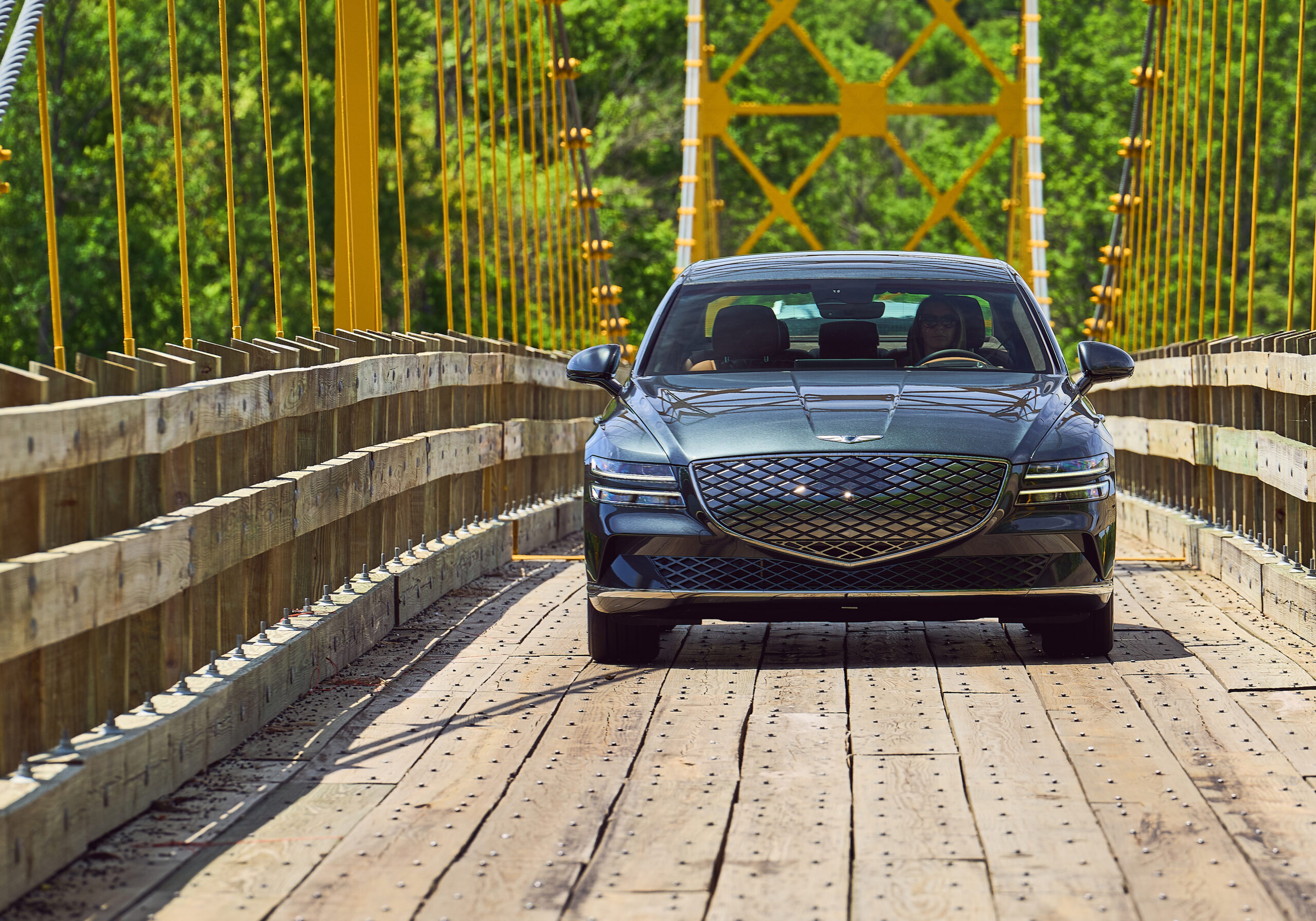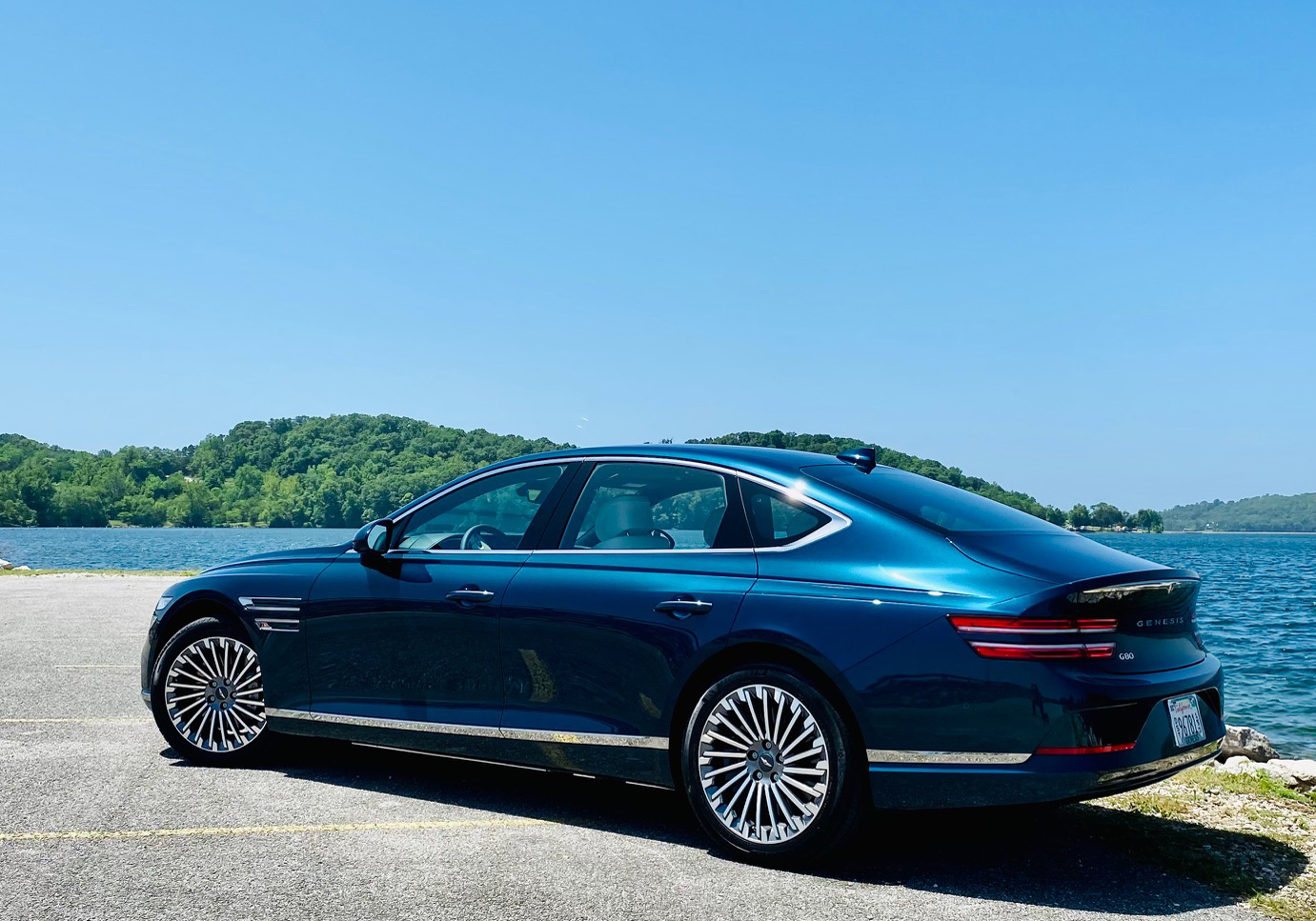
Genesis, the Hyundai Motor Group’s luxury brand, has launched an impressive string of cars and crossovers since its inaugural G80 sedan in 2018. Now comes the Electrified G80 sedan – which we’ll call the G80 EV, for brevity and to make it clear that this is an all-electric midsize, not a hybrid.
[A 10-min. read.]
Inside and out, the 2023 G80 EV is the near-identical twin of the gas-burning G80. It most closely aligns with the G80 Sport Prestige trim, the top-of-the-line on the internal combustion side of things.
That’s not a bad thing as the regular G80 is a handsome four-door sport sedan with a sublimely elegant interior. The main differences between the two lie under the G80 EV’s skin. There’s a dual-motor electric powertrain. Electronic all-wheel drive is standard. Suspension tuning is different to account for the weight of the low-slung battery pack. No tailpipes poke out from under the rear bumper.
There’s also efficiency. The electric G80 can deliver up to 282 miles on a single charge and is rated at the efficiency equivalent of 105 mpg for combined city and highway driving.
The Wait is On
But don’t get too interested, at least not this soon.
The G80 EV, launches in late summer or early fall, but initially will be available only in four states – California, Connecticut, New Jersey and New York. A slow rollout across the rest of the county will begin in 2023.
That’s the same launch strategy Genesis is following with its first EV, the recently on-sale GV60 crossover, and likely the same that will be used with the Electrified GV70 crossover – its third EV in a year – when it is launched late this year.
During the wait, Genesis offers an on-line concierge program on its website where the EV- interested can register and sign up for the various notices, bulletins and alerts that will no doubt be pouring out while launch days for the various other states approach.
Just another G80
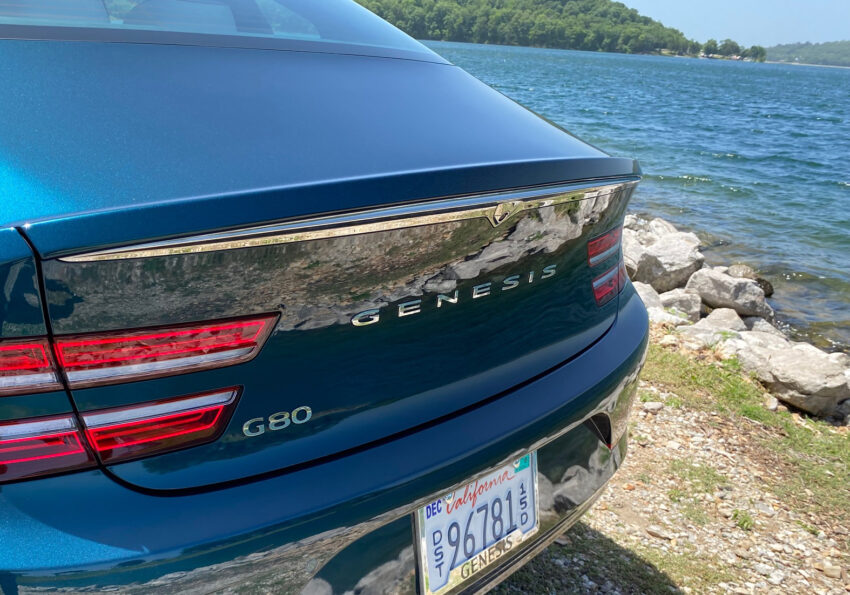
But Genesis intends to be all electric by 2030 and decided, what the heck, to make the Electrified G80 merely another model, a fourth trim in the G80 lineup.
So there’s no “EV” badge, just the chrome “G80” on the tail. The charge port door is hidden in the signature Genesis diamond-pattern grille and unless you notice there’s no tailpipes you’d not know from looking at it parked next to a gas-burner G80 that the Electrified wasn’t just another internal combustion car.
Roominess
Electrification didn’t cost much inside the G80 EV, which Wis fairly roomy for its class. It is impacted a bit, however, because the floor is raised to make room for the battery pack.
Still, the absence of a glass roof means the G80 EV actually has a little more front headroom than the internal combustion version: 40.3 inches versus 39.4 inches. It loses a little in rear headroom, though – 36.6 inches versus 37.6 inches. Legroom is 42.1 inches upfront, 35.9 inches in the second row, compared to 42.5 inches front and 38.7 rear for the “regular” G80.
The non-electric Mercedes-Benz E-Class has almost 2.5 inches less front headroom than the G80 EV, and nearly an inch less front legroom. It is slightly more generous in the rear seating area, with an inch-and-a-half more headroom, and the E-Class’ rear legroom is a negligible tenth of an inch less than the G80 EV’s.
The biggest hit form electrifying the G80 is in the EV’s trunk. it measures just 10.8 cubic feet, versus the standard G80’s 13.1 cubes, so it is almost 11% smaller. And it’s almost 30% less than the average midsize sedan trunk capacity of 15 cubic feet.
Pricing and Trims
The G80 EV comes in only one trim level, with no packages or options.
Pricing hasn’t been set yet, but we’d expect it to begin around or maybe even slightly below the $70,795 starting price of the G80 Sport Prestige – the gasoline version that’s the closest to the Electrified in features and content.
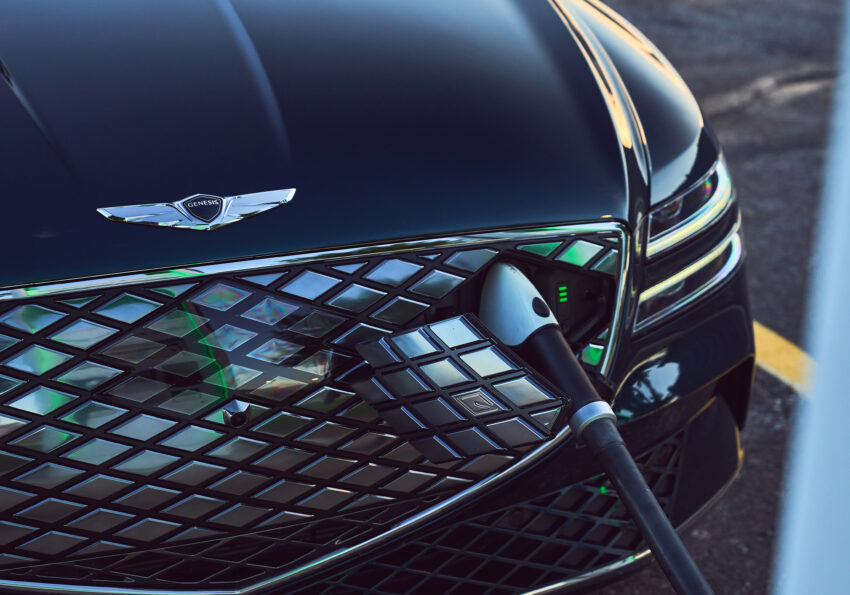

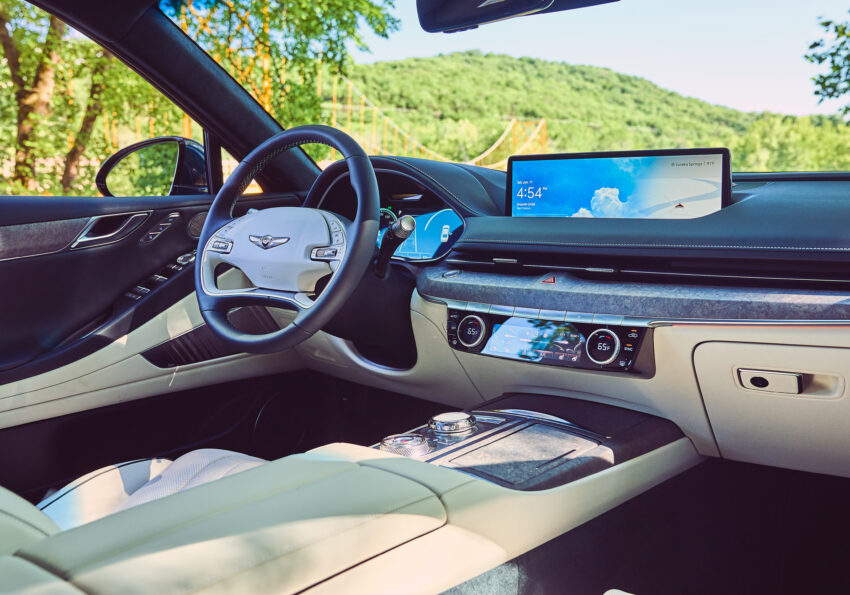
It is built on the same performance-oriented platform introduced with the redesigned 2021 G80 Sport, but modified to accommodate an EV.
Weighty Matters
Pounds impact range and efficiency in an electric probably more than in an internal combustion car, so the electric G80 has a number of aluminum parts, making the body structure 11% lighter than the steel body of the internal combustion G80. To help shave more pounds, the G80 EV eschews the panoramic glass roof that’s with the G80 Sport, and drops a real spare in favor of a tire sealant and inflator kit.
Still, the G80 EV’s battery weighs in at a hefty 1,204 pounds, so the 5,038-pound car arrives at the dealership almost 600 pounds heavier than the beefiest internal combustion version.
The EV’s 82.7-kilowat-hour battery pack is slung under the floor, not shoe-horned into the trunk and under the seats, as has been the case with other ICEs converted to electric, so the Electrified G80 helps offset its greater weight with a lower center of gravity and more balanced front-to-rear weight distribution.
G80 EV Performance
The EV uses a pair of electric motors, one for each axle, along with a single-speed gearbox and the necessary electronic control units for power management and operation of the electric all-wheel drive system, which can send close to 100% of torque to the rear axle for quicker acceleration and livelier handling.
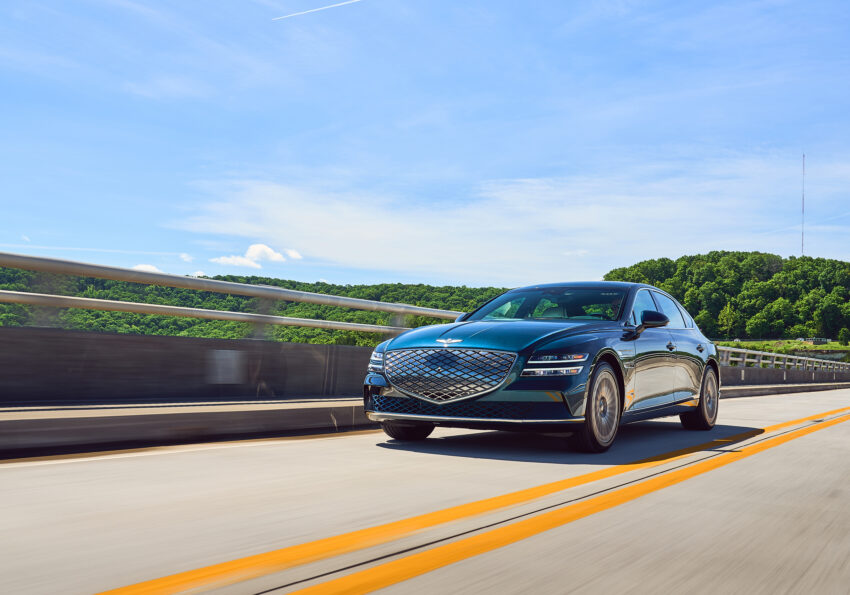
The G80 EV’s dual motors have a combined maximum output of 365 horsepower, 10 less than the G80 Sport. But the EV boasts a hefty 516 pound-feet of torque, versus 391 lb-ft that the turbocharged V6 Sport delivers. And the electric G80’ grunt is available, as in all EVs, from the moment the motors start revving.
The G80 EV’s extra weight and low center of gravity actually helps a bit with roadability, keeping the body level and tires glued to the asphalt in most circumstances. And the extra torque makes up for the slight reduction of horsepower. Genesis won’t say so, but he Electrified G80 likely would wind up in a dead-heat with the 4.9-second G80 Sport in a 0-60 mph sprint.
On the road, the G80 EV is well-grounded, exhibits little body roll and is fairly agile on its 19-inch alloys and all-season rubber.
Genesis brought a small group of auto writers to the hilly Ozark country of northwest Arkansas, home of Walmart, and southwest Missouri lake country near the entertainment center of Branson (think the Ozarks without HBO’s Byrd family).
The terrain – gentle hills, lots of two-lane roads with lots of curves and even a few banked turns – was a great place to test. The TheGreenCarGuy found the G80 EV to be quite responsive when pushed hard through the twisties but overall more suited for cruising, commuting and ln drives in the country for than road racing.
Steering was responsive, though, and a little on the firm side, especially in Sport mode, which also stiffens the electronically adjusting suspension and increases accelerator pedal sensitivity. Other drive modes are Eco, for maximum efficiency, and Comfort for everyday driving.

A “look-ahead” feature of the suspension system uses a front-facing camera and the navigation system map data to spot road conditions ahead of the car and adjust suspension dampening to improve stability and ride quality on nasty surfaces. We never noticed it working, but that’s probably a good thing. We also never had an overly bouncy or jarring ride.
Safety and Driver Assist
The G80 EV comes with a full suite of advanced driver assistance technologies, including lane following and centering and full-range cruise control, which can make a long drive easier and reduce tension and fatigue when negotiating stop-and-go congestion.
The list includes adaptive cruise control with full stop-and go capability, lane keeping and lane centering assist, blind spot alert with side-collision avoidance assist, rear cross traffic alert with collision avoidance assist, forward collision avoidance assist, parking distance warning, a surround-view camera system and monitor and a head-up display.
G80 EV Range
Official EPA numbers haven’t been published yet, but Genesis says the Electrified G80 will travel up to 282 miles on a full charge. Our real-time experience supported that.
Our test car had 242 miles of range available when the drive started, and 187 miles later – a lot of that done in hilly country – it showed 58 miles remaining. That means through the minor miracle of regenerative braking, we added enough juice to gain 3 additional miles of range during the trip.
Much of the drive was accomplished with the G80 EV’s regenerative braking set at i-Pedal, the strongest of its four levels.
In that mode, also called one-pedal driving, regeneration is so strong that at city driving speeds it will bring the car to a complete stop without use of the brake pedal, adding valuable electrons to the battery as it slows. Used while tackling tight curves at speed, i-Pedal acts like a manual downshift – engaged simply by lifting off the throttle.
Charging
We didn’t need to recharge the battery, but if we had, the G80 EV I the only luxury electric sedan using super-fast 800-volt charging architecture. When plugged-in to a 350-kilowatt DC fast charger, it takes just 22 minutes to add almost 200 miles of range, bringing a 90% depleted electric G80 battery back up to 80% of capacity.
For home charging on 240-volt, Level 2 equipment, a 90% depleted battery can be replenished to 100% in just under 7.5 hours.
So far, the only other EVs with 800-volt capability are the Hyundai Group’s GV60, EV6 and Ioniq 5, along with the Porsche Taycan and Audi e-tron GT. The latter two are high performance models with pricing that starts tens of thousands of dollars above where we expect the G80 EV to start.
Content, Comfort and Convenience
Like its gas-burning G80 siblings, the electric G80 is very well-equipped and sports an elegant, upscale interior design.
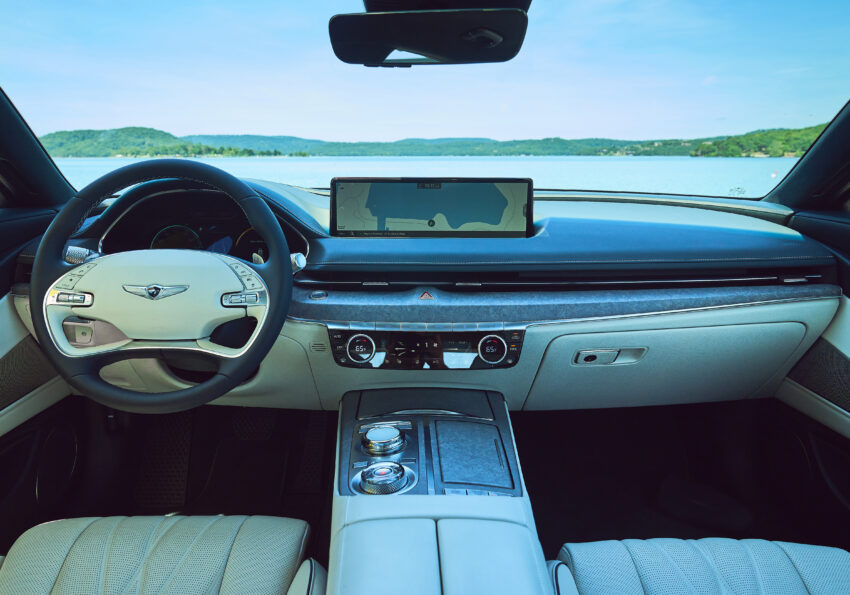
The driver’s seat features Genesis’ “ergo-motion” function that periodically inflates and deflates strategically placed bolsters to keep the driver’s back muscles loose and flexible. It’s not nearly as vigorous as a massage, but it seemed to do the job.
All seats are covered in Nappa leather tanned and dyed with sustainable products. A wood composite that Genesis calls “forged wood” (as in made in a forge, not as in fake) is used for trim on the streamlined, leather-covered dashboard.
The center console supports the EV’s rotary shifter and the redesigned rotary controller for the touchscreen – the old one was flush with the console surface and sometimes hard to control; the new design raises it to provide a good gripping surface around the rim. Voice commands, wired Apple CarPlay and Android Auto and wireless phone charging are standard, as are a quartet of USB ports, two for each seating row.
The console also houses a covered cubby for dual cup holders, a well for cordless phone charging and a sizeable storage bin with an upholstered armrest. All four doors have pockets with bottle holders and there’s a locking glove box.
The electric G80 also has the same power take-off system as the Ioniq 5 and EV6, using juice from its battery pack to power electric tools, small appliances and even provide small amounts of charging to other EVs.
How Will the G80 EV Compete?
As a roomy midsize EV sedan, the G80 has no direct competition although the upcoming Mercedes-Benz EQE, based on the E-Class midsize and due later this fall, could give it a run despite being less powerful and not offering all-wheel drive. BMW’s compact i4 electric sedan is sportier but smaller.
But the success of the Tesla Model S and the interest shown more conventionally designed luxury electric sedans like the i4 and full-size Mercedes-Benz EQS shows that luxury buyers – even though they trend older and possibly more conservative in their taste for automotive design – are definitely not anti EV.
Genesis’ Hyundai Motor Group siblings, Hyundai and Kia, now sell more battery-electric vehicles in the U.S. than any automaker except Tesla.
Genesis EVs use much of the same advanced electrification technology as the Hyundai Ioniq 5 and Kia EV6 crossovers, which should make the G80 EV an attractive alternative to the German brands for car shoppers looking for a luxury car that’s as easy on the environment as it is on the eyes.
